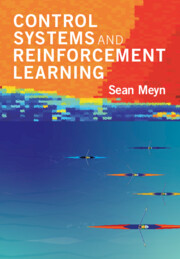
-
Select format
-
- Publisher:
- Cambridge University Press
- Publication date:
- 17 May 2022
- 09 June 2022
- ISBN:
- 9781009051873
- 9781316511961
- Dimensions:
- (253 x 177 mm)
- Weight & Pages:
- 1.04kg, 450 Pages
- Dimensions:
- Weight & Pages:
You may already have access via personal or institutional login
Book description
A high school student can create deep Q-learning code to control her robot, without any understanding of the meaning of 'deep' or 'Q', or why the code sometimes fails. This book is designed to explain the science behind reinforcement learning and optimal control in a way that is accessible to students with a background in calculus and matrix algebra. A unique focus is algorithm design to obtain the fastest possible speed of convergence for learning algorithms, along with insight into why reinforcement learning sometimes fails. Advanced stochastic process theory is avoided at the start by substituting random exploration with more intuitive deterministic probing for learning. Once these ideas are understood, it is not difficult to master techniques rooted in stochastic control. These topics are covered in the second part of the book, starting with Markov chain theory and ending with a fresh look at actor-critic methods for reinforcement learning.
Reviews
'Control Systems and Reinforcement Learning is a densely packed book with a vivid, conversational style. It speaks both to computer scientists interested in learning about the tools and techniques of control engineers and to control engineers who want to learn about the unique challenges posed by reinforcement learning and how to address these challenges. The author, a world-class researcher in control and probability theory, is not afraid of strong and perhaps controversial opinions, making the book entertaining and attractive for open-minded readers. Everyone interested in the "why" and "how" of RL will use this gem of a book for many years to come.'
Csaba Szepesvári - Canada CIFAR AI Chair, University of Alberta, and Head of the Foundations Team at DeepMind
'This book is a wild ride, from the elements of control through to bleeding-edge topics in reinforcement learning. Aimed at graduate students and very good undergraduates who are willing to invest some effort, the book is a lively read and an important contribution.'
Shane G. Henderson - Charles W. Lake, Jr. Chair in Productivity, Cornell University
'Reinforcement learning, now the de facto workhorse powering most AI-based algorithms, has deep connections with optimal control and dynamic programing. Meyn explores these connections in a marvelous manner and uses them to develop fast, reliable iterative algorithms for solving RL problems. This excellent, timely book from a leading expert on stochastic optimal control and approximation theory is a must-read for all practitioners in this active research area.'
Panagiotis Tsiotras - David and Andrew Lewis Chair and Professor, Guggenheim School of Aerospace Engineering, Georgia Institute of Technology
Contents
Metrics
Altmetric attention score
Full text views
Full text views help Loading metrics...
Loading metrics...
* Views captured on Cambridge Core between #date#. This data will be updated every 24 hours.
Usage data cannot currently be displayed.
Accessibility standard: Unknown
Why this information is here
This section outlines the accessibility features of this content - including support for screen readers, full keyboard navigation and high-contrast display options. This may not be relevant for you.
Accessibility Information
Accessibility compliance for the PDF of this book is currently unknown and may be updated in the future.


